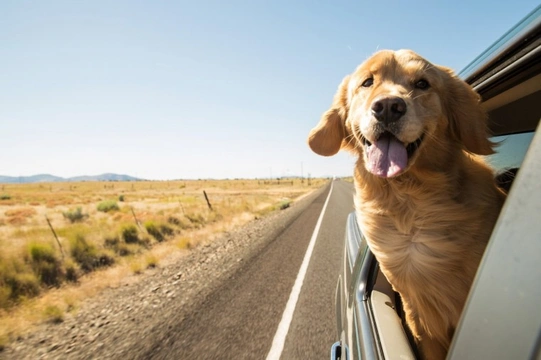
Five frequently asked questions about car sickness in dogs
Car sickness can be a real problem if your dog reacts badly to being in the car, and is apt to make journeys stressful and potentially messy when you do have to take them.
Understanding car sickness in dogs is the key to getting on top of it, and so this article will provide the answers to five frequently asked questions about dogs and car sickness. Read on to learn more.
What is car sickness?
Car sickness, motion sickness or travel sickness is something that can affect both dogs and people, and it is essentially a negative physical reaction to the stimulus of being in a moving vehicle. Some people and dogs get it in cars, others in trains, others on planes or boats and some on all forms of transport, and how it manifests for individual dogs can be quite different.
Car sickness in dogs might be literal for some, a physical sickness and vomiting. For other dogs, car sickness might result in feeling unwell but not being sick, or a simple anxiety and clear distress and unhappiness with being in the car.
How car sickness looks in any two different dogs may be quite different, but you tend to be aware of it if your own dog suffers from car sickness.
Is car sickness in dogs a physical or behavioural/emotional problem?
This can be variable, and for many dogs there is a combination of both physical and psychological factors at work. Feeling sick due to experiencing a certain type of motion has its roots in the physical, such as how the movement of a ship is alien to us when first experienced, and it affects our balance and orientation. Travelling in a car or train if you’ve never done this before interferes with your depth perception, focus and balance once more, as our senses are not used to processing this.
Motion sickness then is physical; but for many dogs there is a psychological or emotional element in play too, such as distress, anxiety or fear of travelling. For many dogs, stress, anxiety and negative associations with car travel have their roots in physical motion sickness during their first few car trips, and so remain a problem even in journeys when no physical motion sickness occurs for them later on.
Why do some dogs suffer from car sickness but not others?
Not all dogs develop any form of motion sickness and so, physical response to being in a car, and so unless they otherwise find the trip stressful or unpleasant, they will not get car sick.
A dog that does find the physical sensation of car travel disorienting or if it makes them sick is likely to suffer this in future, as well as potentially developing anxiety by association and so, reinforcing the issue.
Dogs that get used to car travel when very young rarely get car sick, as they adjust quickly and also tend to see car travel as a positive and enjoyable thing, because they are being included in what their people are doing!
As a result of this, the type of dogs most likely to suffer from car sickness are those that rarely travel by car at all, those that don’t take their first car journeys until mature, and those that have had prior negative experiences of travelling in the car.
What are the signs that my dog suffers from car sickness?
Car sickness does not necessarily mean your dog will throw up, although this is the most obvious and annoying manifestation of car sickness in dogs.
Other signs that can indicate a dog suffers from car sickness include:
- Physical vomiting.
- Nausea without vomiting, which may manifest as slobbering or salivating a lot, burping, and making the kind of movements and expressions we dog owners usually learn may well be a precursor to vomiting!
- Shaking or shivering when not cold.
- Yawning, panting, or breathing shallowly.
- Whining, crying, or barking for no good reason.
- Being unwilling to settle, and fidgeting or trying to move around in the car.
- Being unwilling or resistant of getting into the car at all.
- Showing signs of fear or unhappiness in the car, like a flattened tail and ears and hunched up posture.
Should I withhold food or water before a car journey?
If your dog’s car sickness results in them actually vomiting, this is likely to make you avoid taking your dog in the car at all, or at least dreading such trips when you do make them. A common question then from owners of dogs who get car sick is whether or not they should withhold food or water before a car trip to reduce the chances of the dog vomiting in the car.
When it comes to water, no; don’t withhold water from a dog, they should always have access to clean, fresh water.
When it comes to food, don’t give your dog a big meal within four hours of the trip, and certainly don’t fill them up with treats or snacks, but do not starve them.
Having an empty stomach can worsen nausea and a light meal of something bland between 2-4 hours of travel may help; but take your cues from your own dog and plan accordingly.



